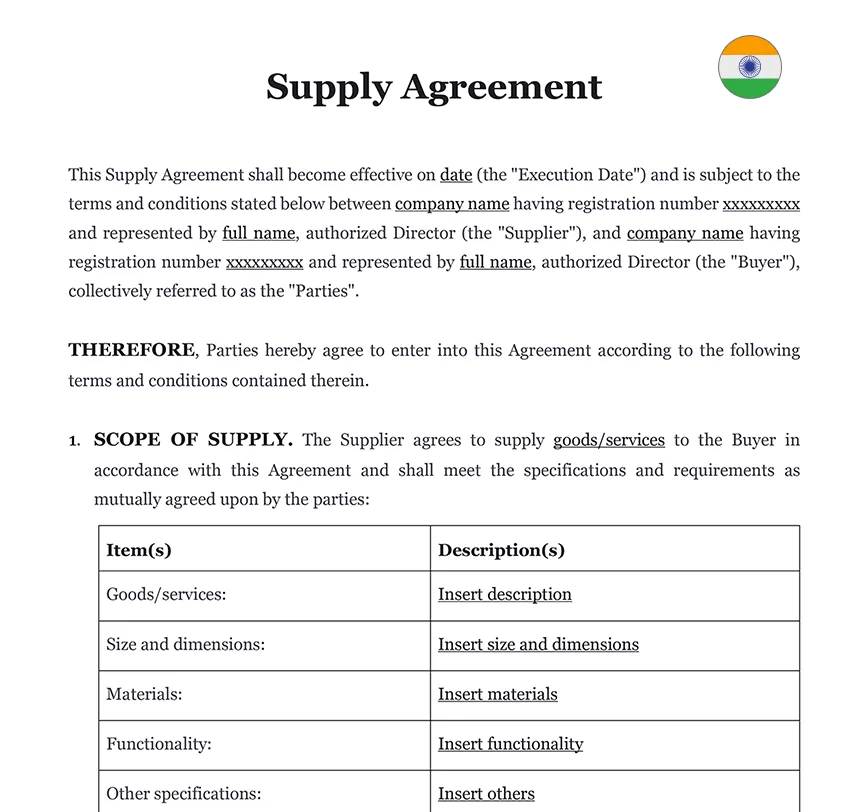Ready to use legal template
Drafted by experienced lawyers
Compliant with Indian law
Ready to use legal template
Drafted by lawyers
Compliant with Indian law
Home › Business contracts › Supply Agreement
Learn more about Supply Agreement in India
Supply contracts are vital legal arrangements that regulate the provisions and conditions of supplying goods or services in India. These contracts define the rights, obligations, and duties of the supplier and buyer. They encompass aspects such as product specifications, pricing, delivery schedules, payment terms, warranties, and mechanisms for resolving disputes. By entering into supply contracts, businesses in India can establish transparent expectations, safeguard their interests, and ensure a seamless and mutually beneficial supply chain association.
Table of contents
What is a Supply Agreement?
A Vendor Agreement, also referred to as a Supplier Contract or an Agreement for Supply, is a legally binding contract between two parties that establishes the terms and conditions governing the provision of goods or services. In the business context, such an agreement is commonly utilized when a company seeks to engage a vendor or supplier for regular delivery of specific products or services.
At its essence, a Vendor Agreement acts as a framework for the relationship between the vendor and the buyer, outlining the rights, obligations, and responsibilities of both parties involved in the transaction. It encompasses the extent of the supply, including the nature of goods or services, quantities, quality standards, delivery schedules, and pricing arrangements.
A well-crafted Vendor Agreement typically covers key elements such as the identification of the parties, agreement duration, payment terms, warranties, protection of intellectual property rights, confidentiality provisions, methods for resolving disputes, and termination clauses. These provisions are essential for clarifying expectations, mitigating risks, and resolving potential conflicts that may arise throughout the supply arrangement.
Having a Vendor Agreement in place ensures that both the vendor and the buyer have a clear understanding of their respective roles and responsibilities, fostering a streamlined and efficient supply chain. It offers a level of certainty and safeguards for both parties, as the agreed-upon terms and conditions serve as a reference point for addressing disputes or discrepancies.
In the Indian business landscape, a Vendor Agreement plays a crucial role in establishing a structured and dependable supply chain, ensuring the punctual and consistent delivery of goods or services. It provides a legal framework that governs the relationship between vendors and buyers, promoting transparency, accountability, and mutually advantageous business partnerships.
What is included in a Supplier Agreement?
A Supply Agreement is a comprehensive document that outlines the specific terms and conditions governing the supply of goods or services between a supplier and a buyer. While the exact contents may vary depending on the nature of the agreement and the parties involved, there are several key elements commonly included in a Supply Agreement.
1. Parties Involved: The agreement should clearly identify the supplier and the buyer, including their legal names, addresses, and contact information.
2. Scope of Supply: This section defines the goods or services to be supplied, including their specifications, quantities, quality standards, and any specific requirements.
3. Delivery Terms: The agreement should outline the terms of delivery, including shipping methods, delivery schedules, and responsibilities for transportation and insurance.
4. Price and Payment: This section details the pricing structure, payment terms, invoicing procedures, and any applicable taxes or fees.
5. Term and Termination: The agreement specifies the duration of the supply arrangement and outlines the conditions under which either party can terminate the agreement, such as breach of contract or non-performance.
6. Intellectual Property: If applicable, the agreement may address the ownership and protection of intellectual property rights related to the supplied goods or services.
7. Warranties and Liability: This section covers any warranties provided by the supplier, limitations of liability, and procedures for handling defective or non-conforming products.
8. Confidentiality and Non-Disclosure: The agreement may include provisions to protect sensitive information shared between the parties, ensuring confidentiality and non-disclosure of proprietary or confidential information.
9. Dispute Resolution: This section outlines the procedures for resolving disputes, including mediation, arbitration, or litigation.
10. Governing Law: The agreement specifies the jurisdiction and governing law that will govern the interpretation and enforcement of the contract.
Including these elements in a Supply Agreement helps establish clarity, protect the rights and obligations of both parties, and ensure a mutually beneficial and legally sound supply arrangement. It is important to tailor the agreement to the specific needs and circumstances of the parties involved to ensure comprehensive coverage and effective risk management.
How to write a Goods Supply Contract?
To compose a contract for the provision of goods or services, it’s crucial to adopt a structured approach. Begin by identifying the involved parties clearly, including their legal names and contact information. Define the extent of the arrangement, specifying the nature and particulars of the products or services being furnished. Address crucial aspects such as quantities, quality standards, delivery schedules, and pricing conditions. Incorporate provisions covering intellectual property rights, confidentiality, and the resolution of disputes to safeguard the interests of all parties.
Ensure clarity by explicitly outlining the rights and obligations of each party. Define the roles and responsibilities of the supplier and the buyer, ensuring an equitable allocation of tasks. Manage risks by incorporating provisions on warranties, indemnification, and limitations of liability. Address procedures for any potential modifications or amendments to the agreement. Consider including clauses pertaining to unforeseen circumstances that might impact the fulfillment of contractual obligations.
Maintain simplicity and clarity in the language used throughout the agreement, avoiding unnecessary complexity. Seek legal guidance to ensure compliance with applicable laws and regulations. Regularly review and update the contract to accommodate evolving business needs and legal requirements. Foster collaboration and communication among all parties to establish a mutual understanding and agreement on the terms and conditions. By following these guidelines, you can effectively draft a comprehensive contract that establishes a solid foundation for a successful business relationship.
What are the advantages of a Supply Agreement?
A Supply Agreement offers several advantages for businesses engaged in the supply chain. Here are some key advantages of having a Supply Agreement in place:
1. Security of Supply: One of the primary advantages of a Supply Agreement is that it provides security and stability in the supply chain. It establishes a formal relationship between the supplier and the buyer, ensuring a consistent and reliable supply of goods or services. This helps businesses maintain continuity in their operations, meet customer demands, and avoid disruptions caused by supply shortages.
2. Defined Terms and Conditions: A Supply Agreement clearly outlines the terms and conditions of the supply arrangement. It specifies the quantity, quality, and specifications of the goods or services to be provided, as well as the delivery schedules, payment terms, and any other relevant provisions. Having these details in writing helps prevent misunderstandings and disputes between the parties.
3. Price and Cost Certainty: With a Supply Agreement, the parties can agree on the pricing structure and terms upfront. This provides price certainty, allowing businesses to budget and forecast their costs accurately. It also helps in negotiating favorable pricing arrangements, such as bulk discounts or long-term pricing commitments, which can lead to cost savings and improved profitability.
4. Quality Standards and Performance: Supply Agreements often include provisions related to quality standards and performance metrics. These provisions ensure that the supplier meets the specified quality requirements and performance benchmarks. By setting clear expectations and monitoring supplier performance, businesses can maintain consistent product or service quality, enhance customer satisfaction, and protect their reputation.
5. Intellectual Property Protection: In certain supply relationships, intellectual property (IP) rights may be involved, such as trademarks, patents, or proprietary technology. A Supply Agreement can include provisions to protect and enforce these IP rights. It establishes ownership rights, confidentiality obligations, and mechanisms for resolving IP-related disputes, safeguarding the parties’ valuable intellectual assets.
6. Dispute Resolution Mechanisms: Supply Agreements often include dispute resolution clauses, which outline the procedures for resolving disagreements or breaches of the agreement. Having predefined mechanisms such as negotiation, mediation, or arbitration can help parties resolve disputes in a timely and efficient manner, without resorting to costly litigation.
In summary, a well-drafted Supply Agreement provides businesses with security, clarity, and control over their supply chain. It ensures a reliable supply of goods or services, establishes clear terms and conditions, mitigates risks, protects intellectual property, and provides mechanisms for resolving disputes. These advantages contribute to smoother operations, enhanced business relationships, and ultimately, the overall success of the parties involved.
Can a Procurement Agreement be terminated?
A contract for the provision of goods or services, like a Supply Agreement, can be terminated under certain circumstances. Termination may occur if either party breaches the terms of the agreement, fails to meet contractual obligations, or violates specified conditions.
Additionally, termination might be allowed through mutual agreement or if certain predefined events, such as force majeure, occur.
It’s essential to include termination provisions in the agreement, outlining the rights and procedures for termination. These provisions should specify notice periods, termination reasons, and any applicable consequences or remedies. Parties involved should carefully review the termination provisions to understand their rights and obligations.
It is advisable to seek legal counsel to ensure compliance with relevant laws and regulations when terminating a Supply Agreement.
What Are the Legal Requirements for a Valid Supply Agreement in India?
To ensure the validity and enforceability of a supply agreement in India, it is essential to meet certain legal requirements. These requirements ensure that the agreement is legally binding and protects the rights and interests of all parties involved. Some key legal considerations for a valid supply agreement in India include:
1. Offer and Acceptance: The agreement should involve a clear offer made by one party and the acceptance of that offer by the other party. Both parties must mutually agree to the terms and conditions of the agreement.
2. Consideration: A valid supply agreement requires consideration, which refers to the exchange of something valuable between the parties. Consideration can be in the form of goods, services, or monetary payment.
3. Legal Capacity: All parties entering into the agreement must have the legal capacity to do so. This means they must be of legal age, sound mind, and not disqualified by any law from entering into contracts.
4. Compliance with Applicable Laws: The supply agreement should comply with the laws and regulations governing the specific industry and the general contract laws of India. This includes adhering to any licensing or regulatory requirements related to the supply of goods or services.
5.Written Form: While not always mandatory, it is advisable to have the supply agreement in writing. A written agreement helps avoid disputes by providing clear evidence of the agreed-upon terms and conditions.
By adhering to these legal requirements, parties can ensure the validity and enforceability of their supply agreements in India.
Share information
Why Themis Partner ?
Make documents forhundreds of purposes
Hundreds of documents
Instant access to our entire library of documents for India.
24/7 legal support
Free legal advice from our network of qualified lawyers.
Easily customized
Editable Word documents, unlimited revisions and copies.
Legal and Reliable
Documents written by lawyers that you can use with confidence.




